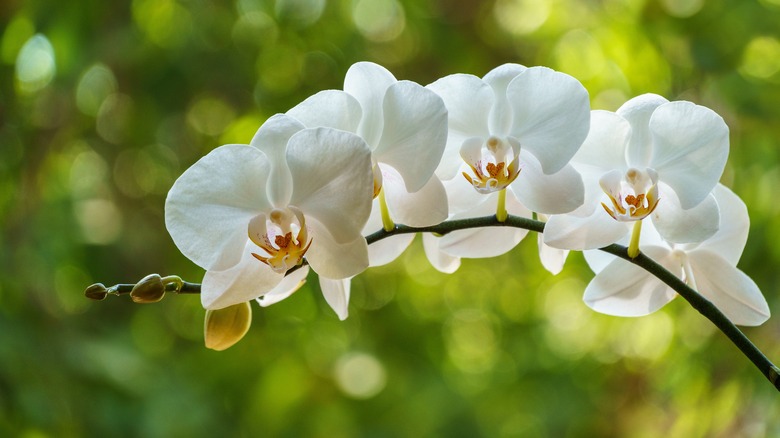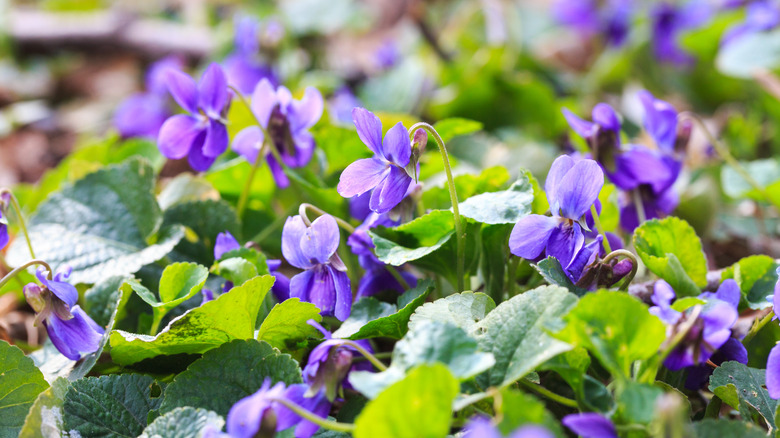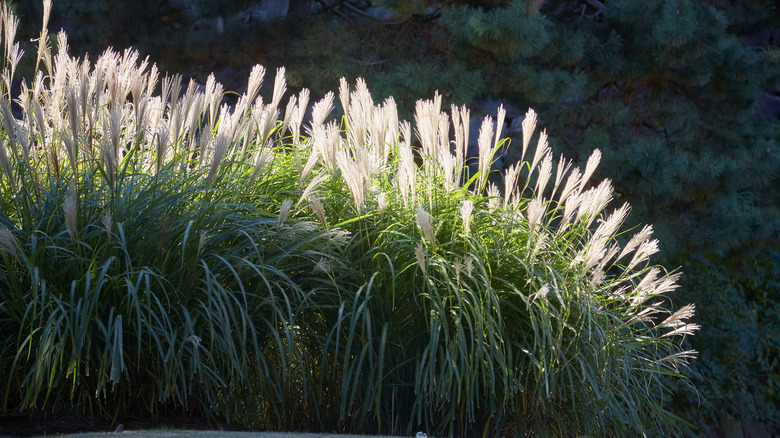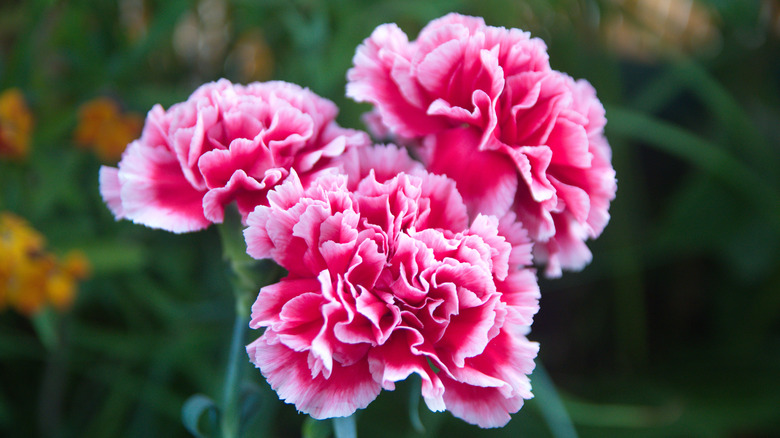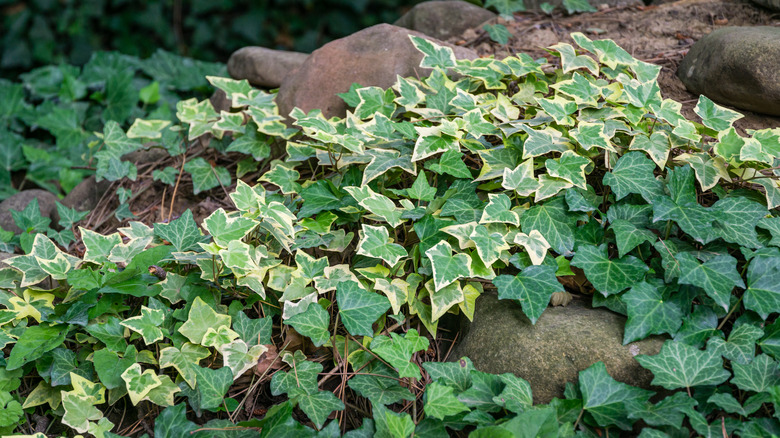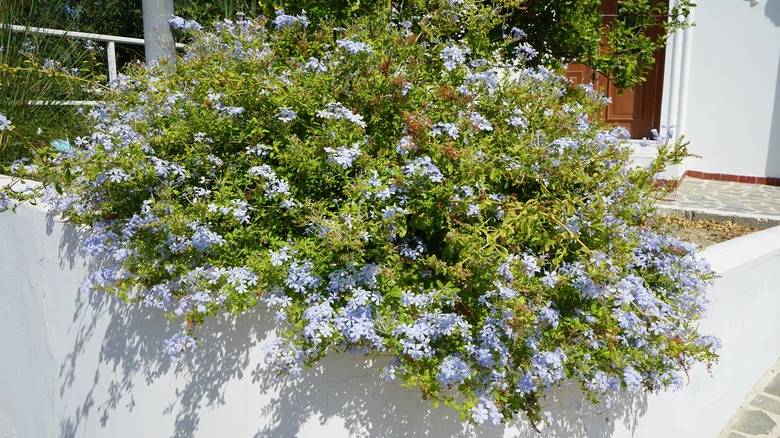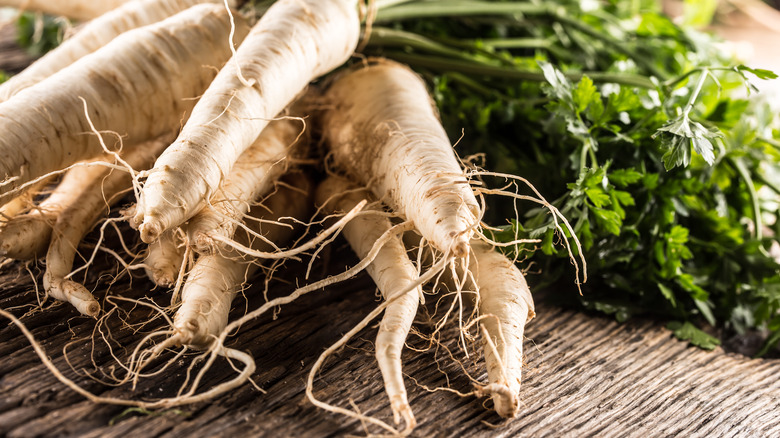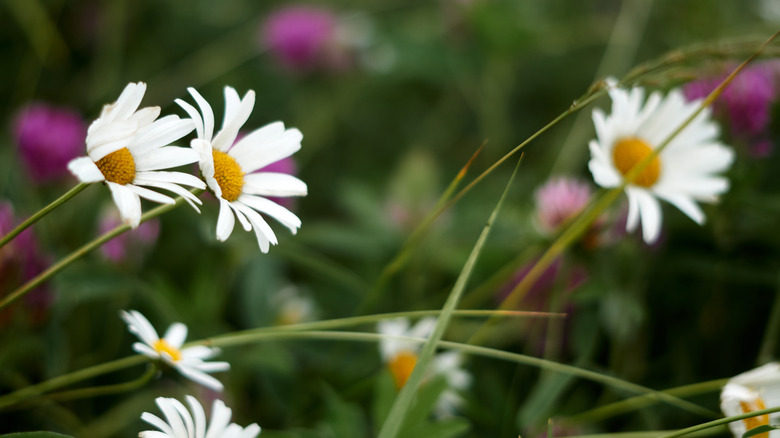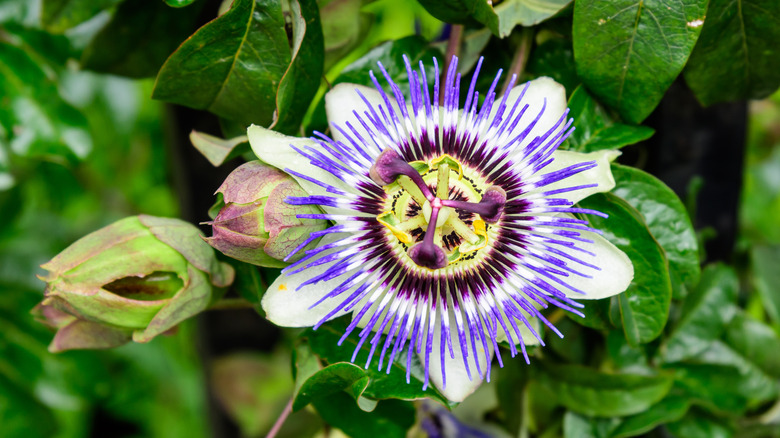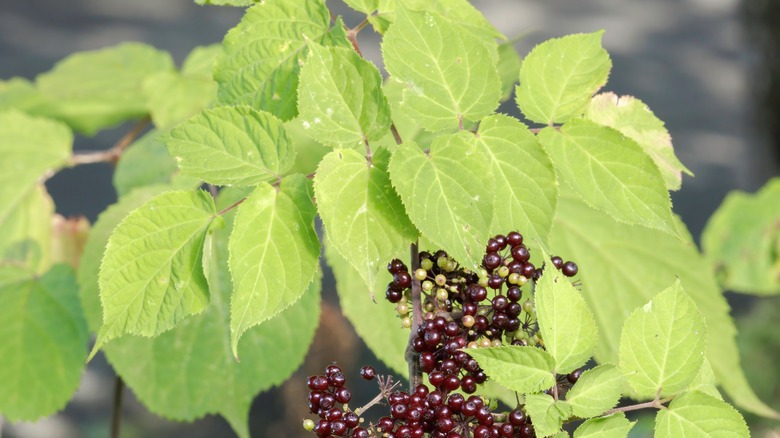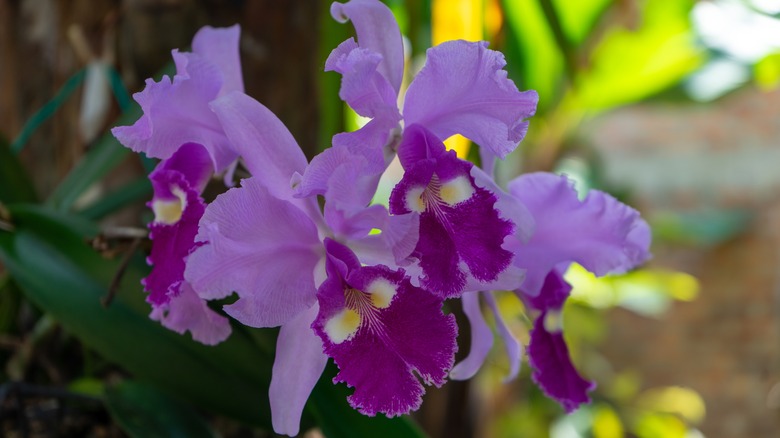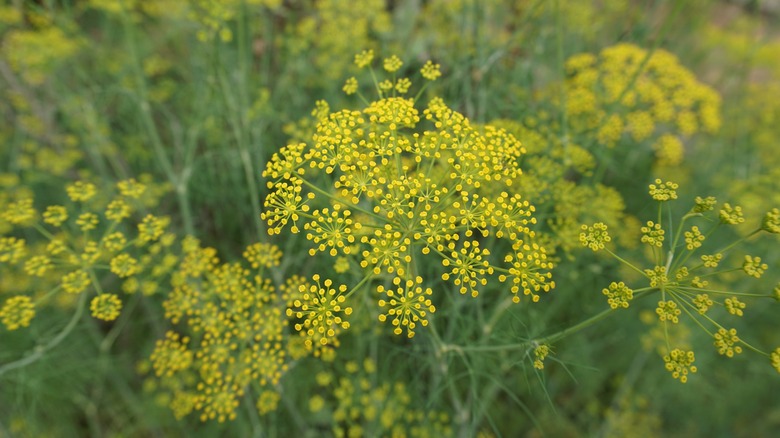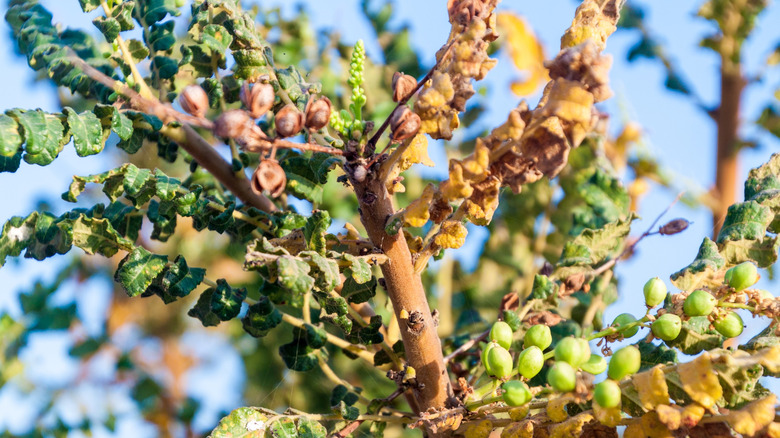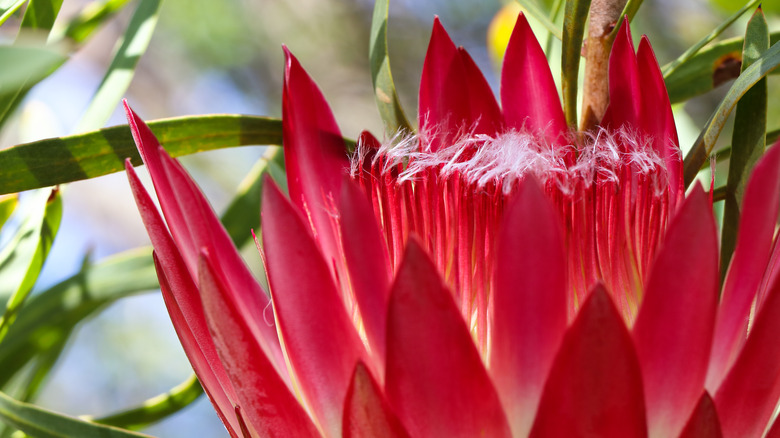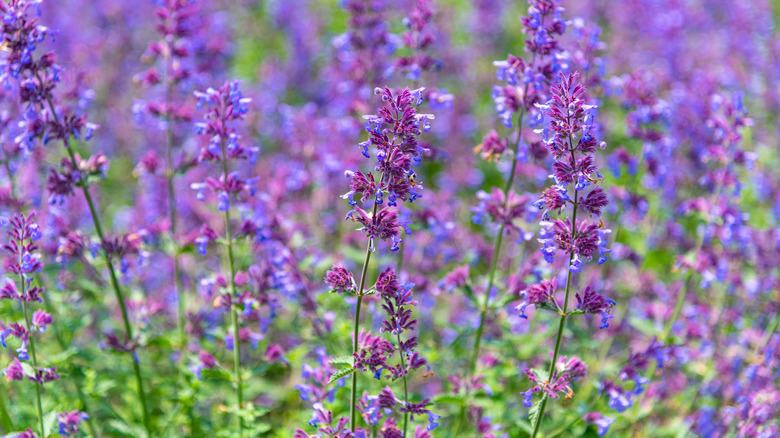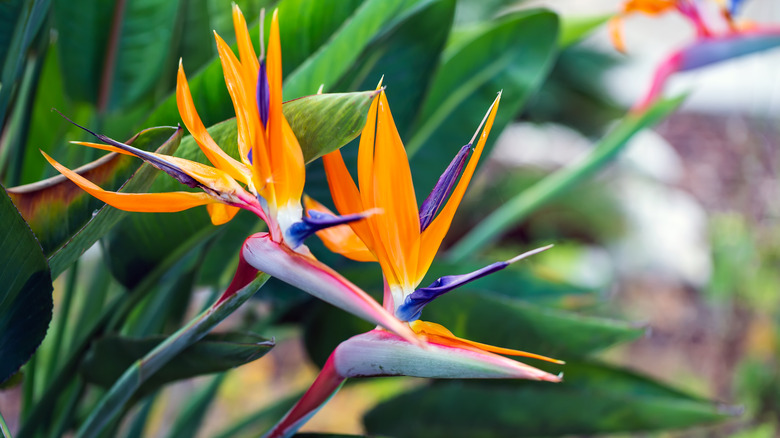The Best Plants For Your Garden If You're An Aquarius
Those born under the zodiac sign of Aquarius can be described in many ways. They are problem-solvers, rioting revolutionaries, intriguing art-makers, and innovative outcasts. A typical Aquarian would be your cool friend from college or high school that went out to travel the world, make something new, and induce change. Wherever they go, Aquarians find themselves redefining utopia. While the air sign sometimes struggles to make close connections with individuals, it knows exactly which humanitarian effort needs its help. This may manifest as a new technological invention, an idea for improving international comaradery, or simply beautifying the environment around them for the sake of mental health and our environment, notes Co-Star Astrology.
If you are an Aquarius who is interested in the latter, we've found 15 garden plants you can introduce to your landscape that will help bring out your astrological nature. These herbs, flowers, bushes, and trees may increase your spiritual energy and allow you to connect to your natural aptitude for communication, spontaneity, and intelligent thinking.
Violets
Violets (Viola odorata) are loved for their dainty blossoms that are colored in shades of purple and blue, as described by North Carolina State Extension. For an Aquarius, the violet flower is important because it's the birth flower for the month of February. It symbolizes modesty, wisdom, and honesty. You can grow this flower in well-draining soil and direct sunlight in almost any state.
Bloom Season: Spring
USDA Growing Zone: 4 to 9
Growing Conditions: Full sun to partial shade
Soil Type: Moist and well-draining
Size: 4 to 6 inches tall and wide
Maiden silver grass
Maiden silver grass (Miscanthus sinensis) is the perfect garden plant for an Aquarius who is saving the world with their pollinator-friendly garden. This ornamental grass is helpful for birds who feed on its seeds and use the long stems for nesting, notes Missouri Botanical Garden. The grass is also beneficial for helpful insects, butterflies, and other pollinators.
Bloom Season: Fall
USDA Growing Zone: 4 to 9
Growing Conditions: Full sun to partial shade
Soil Type: Well-draining
Size: 4 to 9 feet tall and 3 to 6 feet wide
Carnations
Carnations (Dianthus caryophyllus) are known as the birth flower of January. If you are a January-born Aquarius, don't hesitate to buy carnations for your garden. They represent love, respect, and devotion, which every sign can appreciate. More than that, they reflect an Aquarian's uniqueness and passion for ideas that are outside the norm. Monrovia notes that carnations can be a wonderful addition to pollinator, cut flower, or patio gardens.
Bloom Season: Spring and summer
USDA Growing Zone: 3 to 9
Growing Conditions: Full sun
Soil Type: Rich and well-draining
Size: 4 to 36 inches tall
English ivy
English ivy (Hedera helix) is a somewhat weedy plant with trailing stems that can grow more than 80 feet long. Due to its aggressive growth habit, you must be careful where you plant English ivy, but it can make for a great ground cover plant, advises North Carolina State Extension. If you are an Aquarius who is looking for a challenge, this vine is for you.
Bloom Season: Fall and summer
USDA Growing Zone: 4 to 13
Growing Conditions: Full sun to deep shade
Soil Type: Well-draining
Size: 20 to 80 feet long
Blue plumbago
Blue plumbago (Plumbago auriculata) is another beautiful ground cover option, however, it's not quite as weedy as English ivy, so it can be planted as a filler or within a mixed border garden. Its large clusters of blue flowers reflect the power color of Aquarius, and they continuously bloom from spring to fall, notes Monrovia.
Bloom Season: Spring to fall
USDA Growing Zone: 9 to 11
Growing Conditions: Full sun
Soil Type: Slightly acidic and well-draining
Size: 5 feet tall and 6 to 8 feet wide
Parsnip
Parsnips (Pastinaca sativa) may seem like an odd addition to an Aquarian garden. However, according to Tarot.com, the root vegetable is considered to be one of the best edible plants for the sign due to its ability to improve blood circulation and relax the nervous system. The Royal Horticultural Society says that parsnip plants are low-maintenance, and you can leave them in the ground until you're ready to eat.
Bloom Season: Summer
USDA Growing Zone: 4 to 8
Growing Conditions: Full sun to partial shade
Soil Type: Moist, average soil
Size: 2 to 5 feet tall
Chamomile
The chamomile plant (Matricaria chamomilla), similar to the parsnip plant, is well known for its health benefits. According to North Carolina State Extension, the flower is often used in teas and other brews to sedate the restless. Aquarius, who typically struggles with winding down after a long day of innovation, may benefit from growing chamomile in their countertop herb garden.
Bloom Season: Summer and fall
USDA Growing Zone: 2 to 8
Growing Conditions: Full sun to partial shade
Soil Type: Well-draining
Size: 13 to 30 inches tall and 8 to 12 inches wide
Passionflower
The passionflower plant (Passiflora incarnata) can be recognized by its large, usually 3-inch wide, blooms and green pinnate compound leaves. Passionflowers, which are both attractive and edible, offer a range of uses to Aquarians who appreciate it for inspiration or its medicinal properties. As mentioned by the University of Florida, passionflowers may be used to make a relaxing tea.
Bloom Season: Summer and fall
USDA Growing Zone: 7 to 11
Growing Conditions: Full sun
Soil Type: Moist and acidic
Size: Up to 25 feet long
Spikenard
Spikenard (Aralia racemosa) is an herbaceous perennial that is native to the United States, per Missouri Botanical Garden. It is also frequently referred to as American spikenard. Like the sign Aquarius, this plant brings a lot to the table. It bears fruit for birds, and its roots can be used to flavor teas and soda. The roots have also been used to treat infections, burns, and other skin irritations.
Bloom Season: Summer
USDA Growing Zone: 3 to 8
Growing Conditions: Full sun to partial
Soil Type: Well-draining
Size: 3 to 5 feet tall and wide
Christmas orchid
Christmas orchids (Cattleya trianae) are one of the best kinds of orchids you can grow at home. The orchid is the official flower of Aquarius, so don't skip planting this one in your garden. North Carolina State Extension advises gardeners who live in warm climates to provide their Christmas orchid with some shade, well-draining soil, and water. With good care, it will bloom with yellow or purple flowers on 2-foot tall stems.
Bloom Season: Winter
USDA Growing Zone: 11
Growing Conditions: Partial shade
Soil Type: Well-draining
Size: 3 inches to 2 feet tall and wide
Fennel
The fennel plant (Foeniculum vulgare) is another great addition to an edible garden. Its leaves, young shoots, seeds, and stems are used in many different dishes from pastries to Italian sausages, according to the University of Wisconsin-Madison. An Aquarius can benefit from adding this herbaceous perennial to their garden because it's packed with healthy vitamins and nutrients that this hard-working sign needs.
Bloom Season: Summer
USDA Growing Zone: 4 to 9
Growing Conditions: Full sun
Soil Type: Well-draining
Size: Up to 6 feet tall
Frankincense
Frankincense (Boswellia sacra) has a long history of use in many religious practices including yoga and meditation. The University of Arizona explains that this tree's most valuable component is the resin from its bark. Because of their value, the trees are facing the threat of extinction. Frankincense can be difficult to grow if you don't live in the right environment, however, it can be grown in a container to be moved inside when necessary.
Bloom Season: Spring
USDA Growing Zone: 10 to 11
Growing Conditions: Full sun
Soil Type: Well-draining
Size: Up to 20 feet tall
Sugarbush
Sugarbushes (Protea repens), which are native to South Africa, are known for their beautiful red flowers and large growth habit, explains Australian Native Plants. An Aquarius who needs more privacy at home can grow the shrub into a hedge to block out nosy neighbors. Additionally, they will reap the benefits of feeding local birds and sheltering native butterflies and other beneficial insects.
Bloom Season: Fall to spring
USDA Growing Zone: 8 to 11
Growing Conditions: Full sun
Soil Type: Well-draining
Size: 8 feet tall and 6 feet wide
Catnip
Catnip (Nepeta cataria) is known for its pungent smell that attracts felines. While an Aquarian's cat goes crazy in the garden, they can collect the leaves to crush and make tea or potpourri. Both concoctions are thought to help ease anxiety, pain, and stomach problems, per Missouri Botanical Garden. If you're a beginner gardener, catnip is a great option because it's an easy-to-care-for self-seeding flower.
Bloom Season: Spring
USDA Growing Zone: 3 to 7
Growing Conditions: Full sun to partial shade
Soil Type: Well-draining
Size: 2 to 3 feet tall and wide
Bird of paradise
Birds of paradise (Strelitzia reginae) are somewhat large landscape plants that are grown for their exotic blooms which, of course, look like birds. These flowers are normally orange and blue, and they can bloom year-round if you live in the proper climate, says Monrovia. As they strive to stand out from the crowd, the bright and colorful blossoms of this flowering plant match the energy of Aquarius.
Bloom Season: Summer
USDA Growing Zone: 9 to 11
Growing Conditions: Full sun to partial shade
Soil Type: Rich and loamy
Size: 3 to 5 feet tall and wide
